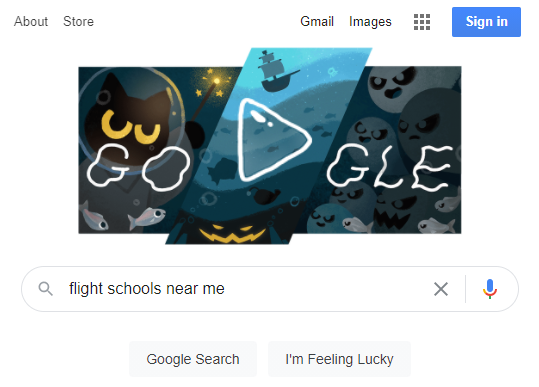Learning to fly can be one of the most challenging, yet rewarding activities you may ever partake upon in your life.
One of the most important decisions you will make about your flying career is choosing the right flight school.
Sometimes this is not so easy, as you may only have one or two flight schools nearby that can accommodate your needs.
If you are serious about learning to fly, you should follow these simple tips when choose the right flight school.
Related Article – ATP Flight School Review: My Experience As A Student
#1. Finding A Flight School Near You
Obviously the first step in choosing a flight school is finding out which ones are closest to you!
There’s a few ways to do this, but there’s also a few things to keep in mind first:
- The closest school might not always be your best choice.
- Not all flight schools offer fixed wing training.
- Your ultimate goals should dictate where you go.
I’ll discuss all of these in more detail further along in the article, but first, back to finding a flight school near you.
Here’s your 2 best options:
Google Search
The quickest, and frankly easiest, way to find a flight school near you is through a Google search.
To make things easy for you, click this link to see the closest schools near you.
Living in Jupiter, FL, I have 3 flight schools (fixed wing) that are within a 45-min. drive:
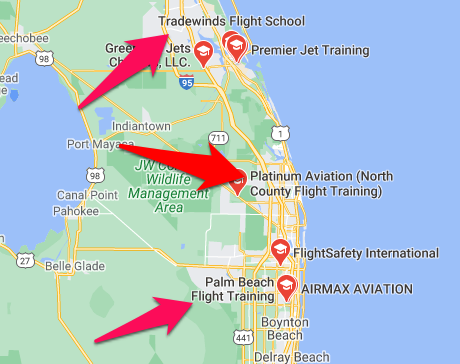
The nice thing about Google is, not only can you find the closest school to take lessons, but you can also read reviews from real customers of those schools.
AOPA Flight School Finder
Another great way to find a pilot school near you is by using the AOPA finder.
Simply click here, and enter in one of the 3 options presented: State abbreviation, Zip code, or School name.
Since you’re just beginning, your best bet would be to simply put in your zip code.
One you enter in your zip code, you can also expand (or contract) the radius for your search to 25, 50, or 100 miles.
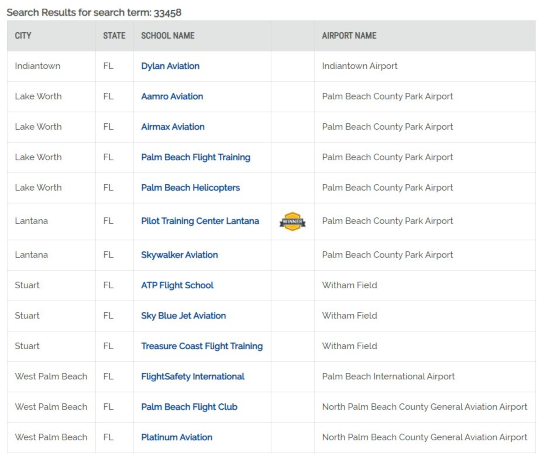
AOPA designates certain schools with a ‘Winner’ icon next to their name.
According to them, this designates most current year award recipients, and is only handed out to the most respected flight schools.
2. What Are Your Aviation Goals?
Another important thing you need to consider when searching for a flight school near you is asking yourself the following question:
“Am I looking to fly for fun, or do I want to make this a career?”
If you’re just looking to take some flying lessons to see if you get the flying bug, then a simple mom and pop flight school might be the way to go.
However, if you’re thinking about becoming a pilot for a living, then you might want to take a closer look at some of the larger aviation schools.
These larger schools typically have a larger fleet, a dedicated full-time flight instructor staff, and more resources overall.
3. Availability of Instructors
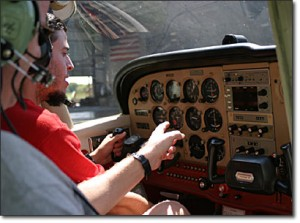
This is a big one. I can’t tell you how many times I have called a flight school to get checked out in one of their airplanes so I could rent it, only to find out there are no flight instructors there.
You have to realize that most flight instructors are paid on an hourly basis, and ARE NOT paid when they are not flying.
There are exceptions to this, such as a chief or assistant chief pilot, but as a whole they are only billing for the time that they are training you.
So it goes without saying that if they are not being paid to sit around, they probably won’t be there.
Then you get the dreaded flight instructor that never seems to be on the schedule.
For those schools that don’t require their instructors to be available 5 or 6 days a week, you will often find that they will only put themselves on the schedule once or twice a week.
That may seem like enough time, but when considering how many students the particular school may have, you may find yourself going weeks without getting a lesson.
You may also find that certain instructors are just impossible to get a hold of.
I remember when I first started my training, I always wanted to fly with the chief flight instructor, but could NEVER GET HIM ON THE SCHEDULE.
I mean, you literally had to book the guy 2 months out to get a lesson with him, and oftentimes the lesson would end up being cancelled because of bad weather or some other reason.
The reason why I wanted to fly with him specifically was that he had about 5,000 hours at the time, with about 3,000 of them giving instruction.
Yeah, you could say he knew his stuff.
Related Article – Instrument Proficiency Check (IPC) Requirements
4. Choosing The Right Flight Instructor
You should always consider interviewing a prospective flight instructor and ask him as many questions as possible, like:
What is your pass rate for students?
The pass rate is a simple calculation. You take the number of students this particular instructor has signed off for a checkride, and divide the number of those he signed off by the number of those that failed.
So X Sign Offs / # of failures…
I know of several flight instructors that have a near 100% pass rate.
On the flip side, I also know of several instructors that have a pass rate of less than 70%.
You can reasonably conclude that instructors with higher pass rates are better instructors in general.
How long have you been an instructor?
Sometimes you won’t have a choice here. Many flight schools near you will struggle to find, and ultimately keep, flight instructors.
There tends to be a high attrition rate for instructors, due to the nature of aviation employment.
With that said, landing an instructor that has been teaching for many years vs. instructors right out of CFI school will be advantageous.
What are your qualifications?
Meaning, can he/she do instrument and multi engine ratings as well? This may prove useful if you decided to continue on with your training into more advanced stages, only to find out your instructor can’t teach you your instrument rating.
What is your schedule and availability like?
Remember, the key is to treat your flight instructor with respect, but you have to remember that it is a professional relationship. You are the one paying for flight instruction, so you are entitled to know everything there is to know about your instructor.
5. Price or Quality in a Flight School?

You may notice the price of getting a flight lesson at your local schools may vary somewhat, but as a whole, tend to cost about the same.
However, there is a key piece of information that you need to know about the school you are looking to attend, and that is quality.
When I originally started training, I visited a few schools nearby, and found that the price was about the same. But one school had airplanes that looked like they were from the Wright Brothers Era, and the other one looked state of the art. You can imagine which one I chose.
Now, looks are not always an indication of good quality, but in this case it was.
It turns out the airplanes at school A were top notch, had advanced GPA navigation systems in them, were well maintained, and clean.
The other flight school, not so much.
When choosing a flight school for your training, it is very important to find one that not only does their own maintenance, but doesn’t give you a problem when you find a discrepancy.
6. Reputation of the Flight School
Another very important aspect to finding the right flight school is what kind of reputation they have.
There will be several schools in your area, and learning about problems the school may have had in the past may help prevent you from signing up to the wrong one.
One site you can check out is called Ripoffreport.com, and can provide you with any problems a flight school may have had.
You may also be able to find more information about a specific flight school on the internet via forums and crowd-sourced review sites.
My personal favorites are (in no particular order):
- Reddit.com
- AirlinePilotForums.com
- Yelp.com
- Facebook.com
Typically, you’ll be presented with reviews of whatever school you’re looking at via a simple Google search.
With that said, sometimes you’ll need to narrow down your search to get the most accurate info.
For example, if you were looking to find out the reputation of a major flight school such as American Flyers, you might want to run a search like this:
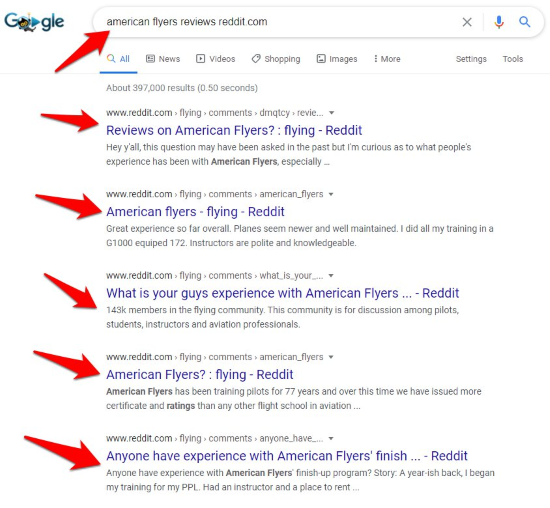
Usually this is reserved for the bigger flight schools, but sometimes you can find more localized information.
Conclusion
Choosing a flight school is never easy, and it does take a fair amount of research and time to find one that not only meets your financial requirements, but also gives you the opportunity to mesh well with the instructors.
If you ever have any questions about a specific flight school, shoot me an email and I’ll do my best to check them out.
In the next chapter of our ongoing series of becoming a pilot, we’ll talk about how to pay for your flight training.
Stay tuned!

